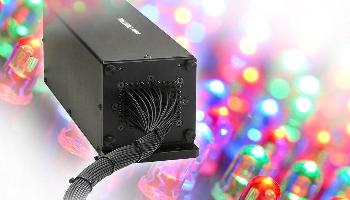Precision sensor manufacturer Micro-Epsilon has launched a series of benchtop multi-point measurement systems that enable faster, easier inspection of light-emitting diodes (LEDs).
The colorCONTROL MFA series starts with a basic version that offers five measuring channels. The colorCONTROL MFA-5 is extremely compact and can verify the colour, intensity and colour temperature (in Kelvin) of up to five LEDs simultaneously. The measuring system is modular and so can be extended by adding extra MFA-E modules in batches of five channels, up to a maximum of 20 modules (i.e. 100 channels).
The MFA is suitable for a wide range of applications, including LED tests (binning), indication and displays, front panels, dashboard sequence tests, self-luminous object inspection. The MFA series is suitable for all manufacturers and developers of LED luminaires, including architectural and street lighting, and LED lighting for automotive interiors.
 The colorCONTROL MFA-5 measurement system.
The colorCONTROL MFA-5 measurement system.
Customer opinion
Crescent Lighting Limited manufactures and distributes LED and Fibre Optic lighting equipment for the UK and world markets. The company supplies a range of LED products for both functional and decorative use, providing long life and low energy consumption.
Kelvin Thomas, Engineering Manager at Crescent Lighting comments: “Many Lighting companies use an integrating sphere to test complete fixtures, which is relatively expensive and time consuming. Most however, lack the capacity to test individual LEDs.
We recently invested in a colorCONTROL MFA unit from Micro-Epsilon and find the speed of use, ease of set up and versatility of the MFA to be key assets. Not only is the MFA inexpensive, it enables very rapid comparison of individual LEDs to be made. Measurements can be taken at different stages in the LED product testing, providing information on how each LED is reacting to changes in temperature and drive current. Colour shift and intensity are rapidly measured enabling the designer to make clear judgement with regards to the design of a product.”
How the MFA series operates
The MFA series operates using optical fibres. The distance between the LED under test and the optical fibre should be 1-2mm, although for bright LEDs, this distance can be greater. Light from the target object is transmitted to the inspection system via a flexible, 2mm diameter, plastic optical fibre and so is evaluated dynamically using a digital colour sensor for colour and intensity. The colour value, which is evaluated within a few milliseconds, is output as an RGB-, HIS or CIE value and then transmitted via USB, RS232 or Ethernet interface at a rate of between 9,600 and 115,200 Baud to a higher level inspection or evaluation system for further processing.
In order to ensure a wide measurement range for intensity (illumination), the user can adjust the sensitivity of the sensor by using two different modes: ‘High Sensitivity’ and ‘Low Sensitivity’ modes. The MFA series enables LED colour recognition up to +/- 4 nm. The digital colour sensor enables a colour depth of 12 bit resolution for each colour, which corresponds to 236 : 68.719.476.736 representable colours. The digital colour sensor therefore reaches an unmatched repeatability of colour and intensity.
The MFA series can be used as a benchtop system for inspection of LEDs or as an online, automated test system. The MFA series is also supplied with set up and configuration software as standard.
Special options
Optional features are available for the MFA series, including different types of optical fibre such as UV, infrared, wide-angle and plastic fibres. Other options include optical fibres with increased vibration protection (VS). For these, friction between the glass fibres is minimised by applying a special surface treatment and impact shocks are reduced by damping.
Glass fibres can also be bonded for high temperature environments. The standard adhesive is suitable for temperatures up to 80 deg C. However, by using special adhesives, temperatures up to 250 deg C can be achieved. If stainless steel sheathing is used, temperatures can be increased even further to 400 deg C.
For more information on the colorCONTROL MFA series, please visit www.micro-epsilon.co.uk or call the Micro-Epsilon sales department on 0151 355 6070 or email: [email protected].